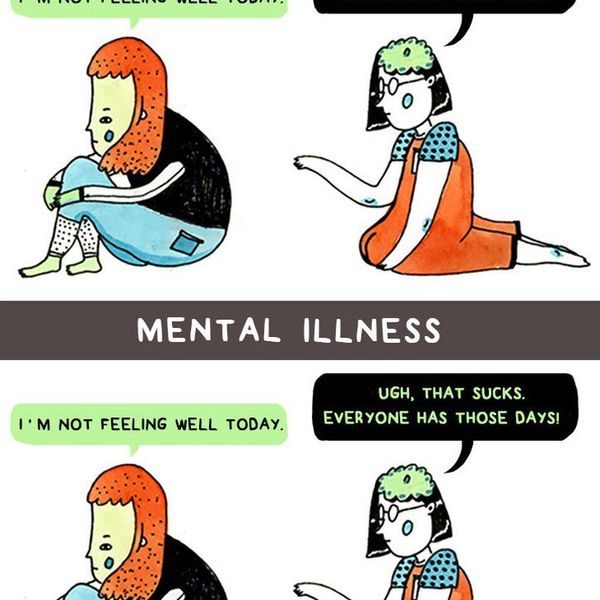I’m an outgoing girl who can hold a conversation with just about anyone. If you ask the people who interact with me on a daily basis what I’m like, I’m sure they would tell you that I constantly have a smile on my face and that my personality is a “good” one. What most people don’t know is that I suffer from severe depression and anxiety and it’s hard for me to get out of bed some days. That I love my life, yet have seasons where I wish I could end it.
I waited until 2014 to be diagnosed with issues that I’ve dealt with alone since middle school, simply because I didn’t know who I could talk to and I was afraid I’d be labeled “broken.” I thought I was alone in my thoughts. I was an athlete who thought her grades were what defined her and thought she had to handle everything herself, that there was no one who would understand. Those thoughts, those standards I set upon myself, eventually led to me dropping out of high school and “losing” everything I had been working for. Fast forward to 2014. I graduated from an alternative high school, finishing one and a half years of high school credits in one semester, and enrolled in a university that I loved. I contacted the volleyball coach and eventually tried out and made the team. I moved to Maryland, started taking my nursing classes and playing volleyball. Almost immediately, I began to feel the same pressure, the same standards. I obsessed over my GPA and my place on the team. I wanted to be better. I pushed and pushed, and eventually, I broke again.
I spent many years trying to pray away an illness that just wouldn’t leave. I remember crying on the bathroom floor to my husband one night, telling him that it felt like my life was going down the exact path it had gone down my sophomore year of high school and begging him to help me understand what was wrong with me. I wanted to give up, again, and he didn’t let me. Instead, he (and some of my best friends) talked me into getting professional help. I didn’t want to. I was afraid that the doctor would tell me I couldn’t handle school, sports, marriage or anything that makes me, me. He didn’t. Instead, he told me ways that I can help cope. He helped me understand why I have the standards I hold myself to, helped me understand that I was not alone in my feelings. I was afraid that admitting I needed mental help would somehow force me to lose myself. I never in a million years would have believed that walking into that office and being diagnosed would free me of burdens that I (and my husband, eventually) had carried for years and help me find a new self that I hadn’t known in far too long. The day I was diagnosed with a mental illness was the start of a new life for me. I didn’t go down the same path I had taken in high school. I didn’t drop out. I was just accepted into nursing school. I was named most improved player of our volleyball team that year. I rebuilt friendships and apologized to many, many people that deserved to hear it. I started to accept the fact that if I try my hardest and still fail, it’s not the end of the world and that no matter what, I would reach my goals.
I want you to know that it's okay if you’re not comfortable reading about mental health issues. Actually, I’m still not comfortable writing about my own. It’s okay for both of us to feel uncomfortable when we talk about mental health. What matters is that we’re talking about it and we’re learning together. I’ve come to learn that growth, whether it be physical or mental, is all about being uncomfortable. We go to the gym and our muscles need to stretch in order to grow, in the same way stretching our minds to understand more about mental health is going to make us feel uncomfortable because we’re just not used to it. We’re used to pushing mental health under the rug. If you’re brave enough to open up to a healthcare professional and be diagnosed with depression, anxiety, schizophrenia, bipolar mood disorder, personality disorders, PTSD, eating disorders or any other mental health illnesses, you will feel uncomfortable. If any of your friends and family go through this experience, you will feel uncomfortable. Don’t let this stop you from asking questions. Learn about your disorder, ask your friends and family questions if they come out of the “mental health closet.” We cannot end the stigma on mental health until we take away the shame attached. Start the conversation, overshare, and dare to challenge your friends and family to feel uncomfortable.
There are still some days that I struggle, badly, with the stress around me. I don’t handle a lot of situations in the healthiest manner, but having a support system and professionals to help me has made a tremendous difference in my life. It’s allowed my husband and I to grow closer and gave me a new outlook on my faith. I finally stopped thinking that there was something wrong with me, that there was a reason God wasn’t healing me, and came to finally understand that I am still fearfully and wonderfully made in God’s image even if I do suffer from a mental illness.
Want to help break the stigma on mental health? Check out this great information from www.breakthestigma.org:
"Break the Stigma by:
1) Not sweeping mental health disorders under the rug and becoming compassionate about tragedies caused by the stigma;
2) Addressing societal apathy towards treatment of the illness;
3) Addressing the lack of education about the complexity of the disorders
4) Addressing the lack of adequate treatment resources and approaches.
In other words, we could break the stigma by becoming mental health advocates. It is estimated that one in five people in the world are affected by the illness."





















